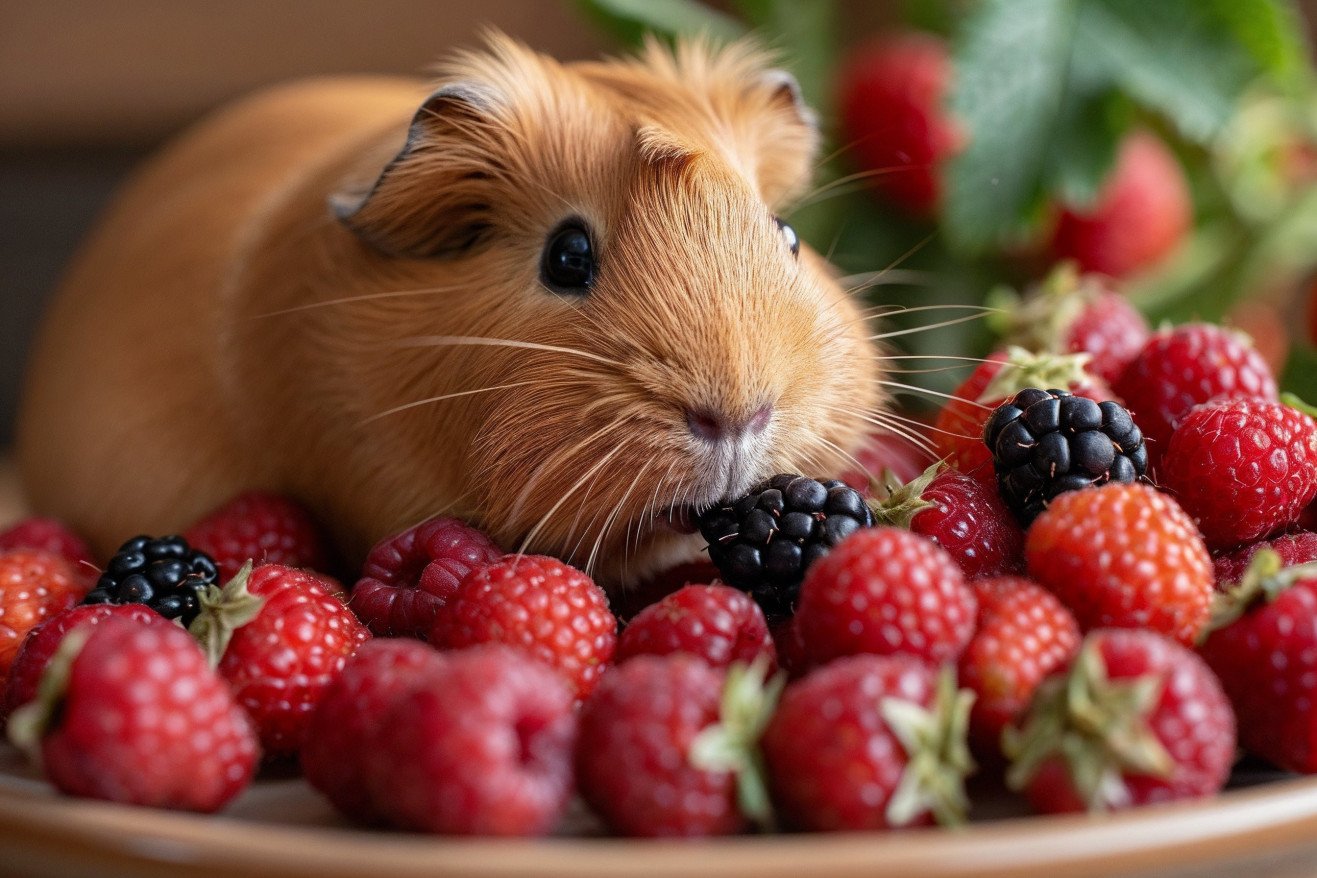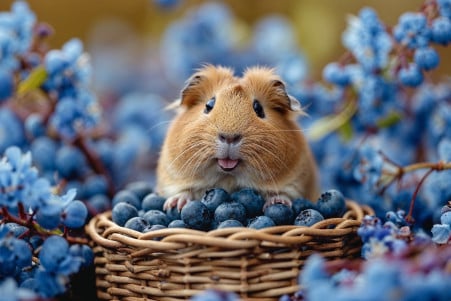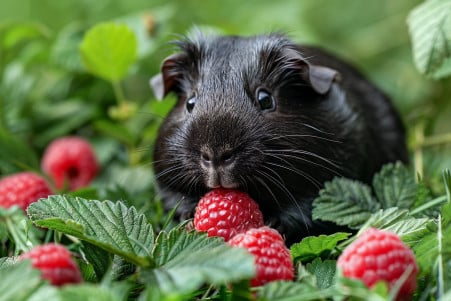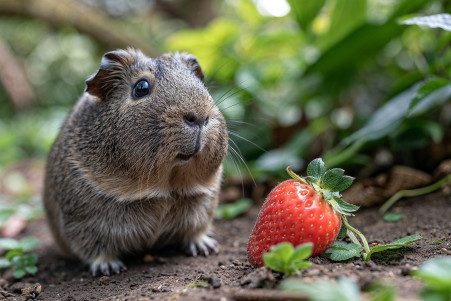Can Guinea Pigs Eat Blackberries? Safe Treat Guidelines
5 February 2024 • Updated 5 February 2024

Blackberries are a delicious treat for humans, but can guinea pigs eat blackberries? Guinea pigs can have blackberries as a treat as long as it’s in moderation because of the sugar content. Blackberries are a good source of vitamin C and fiber, which is good for guinea pigs.
However, only give them to your guinea pig once or twice a week, and never give them canned blackberries or juices, which can upset their sensitive digestive systems.
This article will explore a number of studies on guinea pig nutrition and the nutritional content of blackberries. We’ll look at research in veterinary nutrition, animal care standards, and phytochemistry to find the sweet spot between the positive and negative effects of feeding blackberries to your pet. You’ll also find out how to safely introduce blackberries to guinea pigs so that you can make sure you’re keeping them healthy and happy.
Can guinea pigs eat blackberries?
What Do Guinea Pigs Eat?
The most important thing to remember about a guinea pig’s diet is that it should be primarily hay-based, with some high-quality pellets and a variety of leafy greens. The Humane Society of the United States explains that hay is not only a staple in their diet but also helps with digestion and dental health, so it should make up about 80% of what they eat.
Pellets should be specifically formulated for guinea pigs, with added vitamin C and no seeds or dried fruit. Owners should give them about 1/8 cup a day.
Vitamin C is essential to prevent scurvy, which can be life-threatening to guinea pigs. Since guinea pigs can’t make their own vitamin C, they need to get it from their diet. PDSA says that fresh vegetables should be given to guinea pigs every day, with a special emphasis on those that are high in vitamin C.
However, fruits should be given in moderation because they’re high in sugar, which can lead to obesity and other health problems if guinea pigs eat too much.
FOUR PAWS International recommends that new foods be introduced slowly so that owners can watch for any negative reactions. A healthy guinea pig diet is well-rounded, making sure that they get enough fiber and vitamins (especially vitamin C), while also being careful about how much fruit they consume. This balance ensures that guinea pigs get the most out of their food without any of the negative side effects.
Blackberries: A Guinea Pig’s Vitamin and Mineral Packed Snack
In addition to being known for their bright color and sweet flavor, blackberries are packed with important nutrients. One cup of blackberries contains vitamins and minerals, including 30.2 milligrams of vitamin C—half of the daily recommended value—which is necessary for a guinea pig to make collagen, and 8 grams of fiber, which is important for gut health, according to Healthline.
Virginia Tech’s study found that the antioxidants in blackberries, especially anthocyanins, can help decrease inflammation and improve brain function in guinea pigs. However, because blackberries are high in sugar, they should be fed to guinea pigs with caution. They can cause obesity and other health problems because they are low in calories and high in carbohydrates, according to WebMD.
The best way to feed blackberries to guinea pigs is to give them a small amount, such as a couple of berries, once or twice a week. In the U.S., blackberries are in season from June to August, so that’s the best time to give them to guinea pigs as a fresh, healthy treat. Feeding your guinea pig blackberries in moderation will help ensure they get the health benefits without the risks.
Berries for Buddies: How to Give Blackberries to Guinea Pigs
When feeding your guinea pig blackberries, give them a small amount to make sure they don’t have any trouble digesting them. According to Guinea Pig Academy, you should give them a small piece of blackberry at first and then work your way up to a full berry if they don’t have any negative reactions.
After the first time you feed them blackberries, watch them for signs of digestive issues. Make sure to wash the blackberries well to get rid of any pesticides and cut them into pieces that are easy for your guinea pig to eat.
If your guinea pig does have trouble digesting blackberries, which can be indicated by symptoms like bloating or diarrhea, stop giving them blackberries and talk to your vet.
To make sure your guinea pig has a well-rounded diet, you can also give them other fruits that are safe for guinea pigs, like blueberries, cranberries, and watermelon, but be sure to keep the sugar content in mind and feed them in moderation, according to My Pet Guinea Pig.
If you follow these tips, you can give your guinea pig an occasional treat of blackberries that will help support their health and well-being. Just make sure that you’re always feeding them a balanced diet and introducing new foods carefully.
Berry Concerned: The Dangers of Blackberries for Guinea Pigs
While blackberries can be a healthy snack, there are some dangers and potential side effects that guinea pig owners should be aware of. While there is not a lot of evidence of guinea pigs having specific allergies to blackberries, it is important to watch your pet for signs of an allergic reaction, such as itching or skin irritation, which is similar to the reaction caused by Aloe Vera, according to PetHelpful.
One of the biggest risks of feeding blackberries to guinea pigs is that they can lead to digestive problems, including diarrhea, because of the high sugar content. As a result, treats like blackberries should be fed in moderation and not in place of a diet that is primarily made up of high-fiber hay, vegetables, and pellets, according to Oxbow Animal Health.
This will help ensure that treats like blackberries can be enjoyed without causing digestive upset.
In addition to this, guinea pig owners should make sure that their pets don’t eat blackberry products that aren’t fresh, like jams or canned blackberries.
This is because these products contain added sugars and preservatives that can be toxic to guinea pigs.
As a result, it’s important to monitor your guinea pig for signs of an adverse reaction, including lethargy, bloating, or changes in stool, if they eat blackberries.
To minimize these risks, it’s important to introduce guinea pigs to new foods, including blackberries, slowly and in small amounts, while still making sure that they are getting the fiber they need, according to PetMD.
By doing this, you can help ensure that your guinea pig can eat blackberries safely.
Gut Health: Can Guinea Pigs Eat Blackberries?
A guinea pig’s diet is high in fiber, mainly from grass and hay, and this helps to ensure that their digestive system is perfectly tuned to process this kind of food.
As Supreme Petfoods explains, guinea pigs’ teeth grow continuously to cope with the demands of a high-fiber diet and need to be worn down by chewing on fibrous materials.
Meanwhile, the microbes that help break down fiber, absorb nutrients, and produce caecotrophs—which are nutrient-rich droppings that guinea pigs eat to get the vitamins and amino acids they couldn’t absorb the first time around—are found mainly in the caecum, a part of the large intestine.
Given that blackberries are high in fiber, they can help to support this digestive process. However, it’s important not to go overboard.
A paper in PMC by Julie DeCubellis and Jennifer Graham explains that overconsumption of fruit can lead to an imbalance in the gut microbiota, which can result in conditions like dysbiosis and gastrointestinal stasis. This makes it important to make sure that a guinea pig is responding well to new foods like blackberries. Good signs include regular, well-formed droppings and consistent eating habits.
When it comes to a guinea pig’s diet, the impact of eating fruits like blackberries is something that needs to be considered in the long term. While their fiber content is good, their sugar content means that they need to be fed with caution to avoid digestive problems.
By ensuring that a guinea pig’s diet is mainly hay-based and that fruits like blackberries are fed as an occasional treat, guinea pigs can enjoy the benefits of these fruits without putting their health at risk.
Conclusion: Can Guinea Pigs Eat Blackberries?
In summary, blackberries can make a tasty and healthy snack for guinea pigs if they are fed in moderation. They are a good source of important nutrients like vitamin C and fiber, both of which can be good for your pet. However, because of their sugar content, it’s important to limit the amount of blackberries you feed your guinea pig to avoid overfeeding, which can lead to weight gain and digestive problems.
A healthy guinea pig diet should be based on hay, with smaller amounts of vegetables, pellets, and the occasional fruit like blackberries. When adding new foods to your guinea pig’s diet, including treats, make sure to do so gradually and always monitor your pet for any signs of negative reactions.
To make sure your guinea pig’s diet is well-rounded, you can also consider feeding them other fruits in place of or in addition to blackberries.
You can help make sure your guinea pig stays healthy and happy by feeding them a well-balanced diet. If you have any questions about what to feed your guinea pig, don’t hesitate to talk to your vet. They can give you personalized advice based on your pet’s individual needs. This can help you make sure you’re feeding your guinea pig a healthy diet while still giving them the occasional treat.


